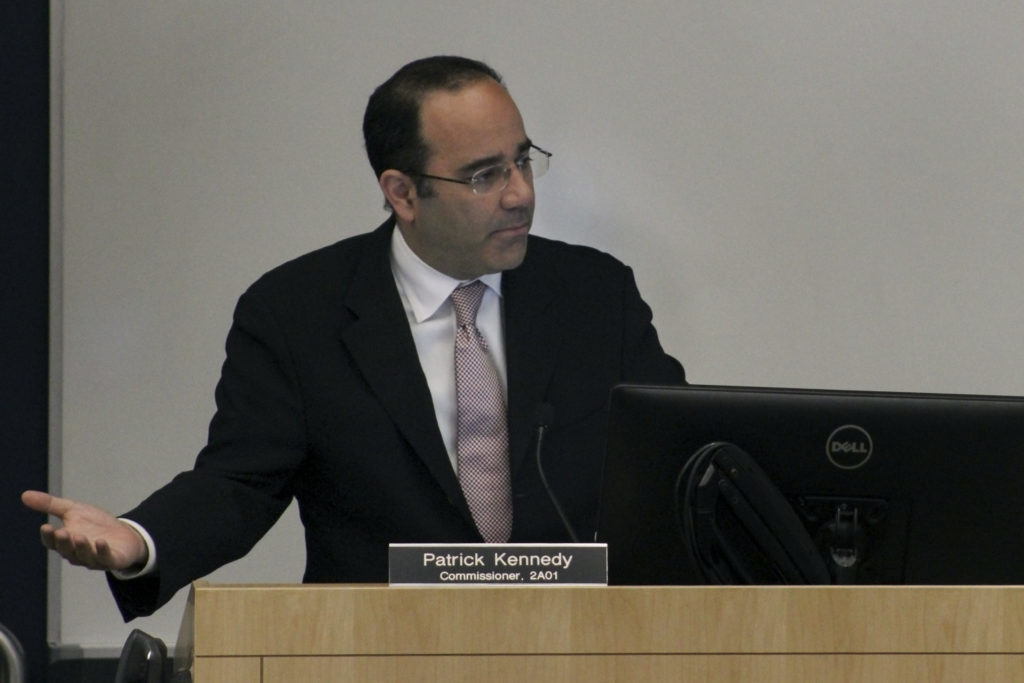GW Hospital officials released the results from a noise test examining if the proposed hospital helipad would be too loud for the area at a neighborhood meeting Wednesday.
Microphones were set up across the neighborhood earlier this month to measure routine noise and the added noise from a test helicopter. The results showed that the noise level was at or below other noise producers, like ambulances, in the area, except for when the helicopter is directly above the hospital.
Still, several community members at the Foggy Bottom and West End Advisory Neighborhood Commission meeting said they were concerned about damage to historic buildings, possible hearing loss and safety, if the helipad were to be built. Others voiced support the proposal.
Babak Sarani, the director of trauma and acute care surgery at the hospital, who presented the findings of the sound study, said the shorter duration and intensity of sound from helicopters, make them a better option for transporting patients than siren-blaring ambulances who often get caught in city traffic.
“In reality you are picking up the exact same noise as helicopter,” Sarani said. “I can prove it to you. I had a microphone there for five days.”
Hospital officials want to build a helipad on the south side of the hospital, above the Foggy Bottom Metro exit, to allow critically injured trauma patients to more quickly receive hospital care. Officials have not set a start date for the helipad’s construction.
Before construction can begin, the D.C. Council must first reverse a law banning hospitals from building new helipads.
The sound test placed 10 different microphones at locations like the Watergate and Varsity on K to measure the routine sound level of the neighborhood between March 30 and April 5. Other devices to measure vibration were placed in a residence by the hospital, Sarani said.
On April 1, a medical helicopter flew six test flights over the hospital. The noise level – measured at 85 to 86 decibels on average – is higher than an indoor garbage disposal at around 80 decibels but lower than a lawn mower at 100 decibels, according to the study. An ambulance can reach the maximum level of 85 decibels, Sarani said.
Sarani said pilots will do their best to “fly neighborly” by taking only approved routes that are less noisy than others. He said there will be about two to three helicopter rides per week and pilots will also factor in weather conditions like fog and low hanging clouds when determining whether to fly.
Sarani said helicopters have airlifted on average of 166 patients to the hospital each year for the last four years, but the patients have to be flown to a helipad near the Navy Yard in southeast D.C. and then be driven by ambulance to the hospital.
The helipad would relieve an overwhelmed MedStar Washington Hospital Center – one of only two District hospitals that have helipads – and reduce the transportation time for patients, especially in a mass-casualty event, Sarani said.
“There’s only so much you can ask of any one hospital before it gets overwhelmed,” he said. “How do you transport someone critically ill across the District with so much traffic?”
Lt. Col. Mike Conklin, a retired Marine who briefly piloted Marine Force One during the Clinton administration, said the process to transport patients would involve a 90-second landing, 15 to 25 minutes for the patient to be transferred while the helicopter’s engine is shut off and another 90 seconds to propel back up.
Six different flight paths, three from Dupont and three from near the Keystone Bridge area, can get the helicopter to and from the hospital following security flight restrictions in D.C., Conklin said.
“You’re talking about the most restrictive flight area in the world for obvious reasons,” Conklin said.
Detrick Campbell, an ANC commissioner and GW junior, asked if a second study on the noise levels caused by the helicopters could be conducted.
“In terms of people who do live here it is something that is a problem,” he said.
ANC Chairman Patrick Kennedy said the commission would discuss the helipad further at the next meeting in May.





